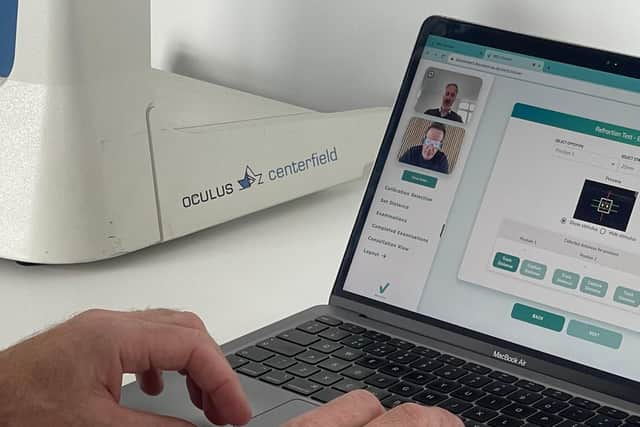Glasgow pioneer behind remote eye testing looks to plug clinician shortages
A Glasgow-based firm whose technology allows eye examinations to be conducted over the internet is using its know-how to boost optometrist availability.
IbisVision, which offers a range of eye tests via the net, plans to use its system to help optical businesses around the world resource more staff amid clinician shortages and increased consumer demand for eyecare. It will work with eye care operators and use its tech to link up with clinical staff via the firm’s remote-led system.
Advertisement
Hide AdAdvertisement
Hide AdAs the company’s technology allows consumers and staff to operate from anywhere, this can help an eye care business facing a shortage of clinicians to access more staff from elsewhere, directing excess or underutilised clinical expertise for their disposal via the internet.


Bosses at the firm said the platform would also allow those eye care professionals who for lifestyle reasons want more flexible working time to provide services as and when they want. They said the widened strategy for the business demonstrated a “critical mass of interest” from eyecare operators in remote solutions.
Patient testing has changed since the pandemic while a surge in the number of workers based at home sitting facing screens for hours at a time has also resulted in a greater number of people needing expert optical intervention.
IbisVision chief executive Mark Roger said: “This platform will achieve two goals to widen the pool of available clinicians. Firstly, it will direct, in real-time, underused resources to where there is demand. Second, since the 9-to-5 model of providing eye care is becoming limiting for the modern-day optometrist, our platform offers the flexibility required to reflect lifestyle needs and requirements.
“The possibilities are endless - whether family obligations or career aspirations are a high priority or there are geographical limitations, optometrists can provide their expertise at a time and location of their choice. A parent can put their children to bed in New York time, and work for a couple of hours for a clinic in LA during the west-coast working day.”
He added: “Our technology has always been cutting-edge in allowing consumers to work with clinicians and undergo tests irrespective of the location of the patient in relation to the clinician. However, what this technology does is as revolutionary as Uber or Airbnb because it puts back resources that may well not find useful deployment locally or may be sitting idle. We can’t control the skills shortage or the growing demand for eye care but we can improve how eyecare is accessed and delivered.”
Remote technology is one of the fastest-growing health sectors as people look to fit appointments into busy schedules and attend appointments with specialists who may not necessarily be nearby. The pandemic has also made patients comfortable with undergoing consultations and tests over visual links.
Last May, IbisVision raised £4.5 million as it pushes into the world’s most lucrative healthcare markets. The firm said it was poised to ramp up sales in the US, where it is estimated there are some 110 million eye tests annually, after receiving a Food and Drug Administration (FDA) listing. It is also looking to tap into the eyecare market of the 448 million citizens across the European Union.
Comments
Want to join the conversation? Please or to comment on this article.